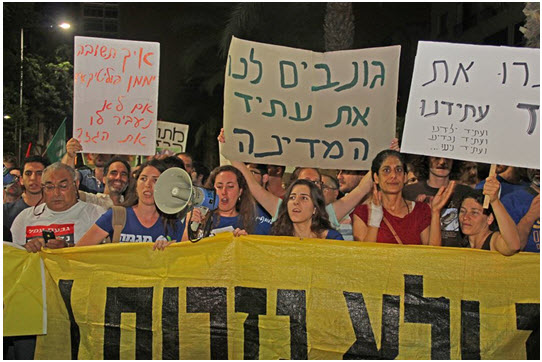US Ambassador to Israel, Dan Shapiro, has been trying to persuade Knesset members of the opposition Joint List to abstain or absent themselves from a Knesset vote advancing a controversial plan to develop Israel’s natural gas reserves, Haaretz and “Kol Israel” (Israel Radio) reported Tuesday.

Thousands of Israelis flooded Tel-Aviv streets on Saturday night, June 27, to oppose the gas deal approved by the cabinet. (Photo: Megama Yeruka)
A “yes” vote would allow the cabinet to implement its agreement with Israel’s Delek Group and Noble Energy of the US to develop the massive Leviathan gas field, some 130 kilometers off the Haifa coast. Shapiro reportedly wants Joint List lawmakers opposed to the deal – which would grant exclusive development rights of the field to Noble and Delek – to withhold their “no” vote, either by abstaining or by not participating in the vote altogether. The ambassador discussed the vote with Hadash MK Ayman Odeh, the head of the Joint List, on Monday, “Kol Israel”said.
The deal, which was endorsed by the security cabinet on Thursday, states that Delek must sell its entire share of the Tamar field, and Noble Energy must sell most of its holdings, within six years. Delek must sell its holdings in two smaller gas fields within 14 months. The firms have been selling gas to the Israeli market from Tamar, which went online in 2013, and have agreed to sell to neighboring countries as well. Leviathan, the largest gas field in the Mediterranean, has not yet been developed. In a vote Thursday, Israel’s security cabinet determined that the gas deal should be considered a matter of national security. Geopolitical concerns hang in the balance, as Israel plans to export natural gas to Egypt, Jordan, and the Palestinian Authority. According to Israeli law, the security cabinet’s ruling that the deal is crucial to Israel’s national security or foreign relations means that the government can overrule any objections by antitrust authorities.
The agreement has been sharply criticized by Antitrust Authority chief David Gilo, who said that it cemented a de facto monopoly over Israel’s natural gas reserves. With Gilo refusing to sign off on the deal, Economy Minister Aryeh Deri had the power to approve it, but Deri refused to assume that responsibility. In the wake of Deri’s decision, Prime Minister Benjamin Netanyahu has been seeking to pass the deal in the cabinet, but in order to do so he needs the Knesset to grant the cabinet the authority to decide. However, with three of his ministers having disqualified themselves from the vote, citing a conflict of interest, the prime minister has been forced to postpone the Knesset vote indefinitely, and on Tuesday Yuval Steinitz, the minister of national infrastructure, energy, and water resources, spoke on the details of the Noble-Delek agreement, in a press conference – a move Netanyahu has hitherto resisted.
Opponents of the agreement, among them the Joint List, Hadash, and the Communist Party, charge the right-wing and neo-liberal government with selling off Israel’s natural resources and accuse Netanyahu of caving to a monopoly. “Those companies do whatever they want,” said Amit Bracha, director of the Israeli Union for Environmental Defense, a lobbying group. “They don’t care about the social issues that we are dealing with today in Israel … We say the natural gas is owned by the people.” The State Comptroller’s Office announced Tuesday that it would look into suspicions of “substantial” mismanagement of the gas contracts by the government.
Israel has just the world’s 38th largest supply of proven natural gas reserves, according to the CIA Factbook. But Israel hopes its proximity to Middle Eastern and European markets could make it a regional player. Shapiro has called on Israel to create incentives to “attract international gas developers.”
Yossi Langotsky, a geologist who initiated the drilling project of the major Tamar field but claims no longer to have a financial interest in the matter, said the government capitulated to the gas companies’ demands. He said Israel made a mistake when it decided to allow the export of 40 percent of its gas two years ago. “The consequences of that short-sighted and irresponsible decision will be the emptying of half of Israel’s emergency stores to satisfy the appetite of the Israeli and foreign gas companies that are seeking quick profits, as well as treasury officials interested in the royalties,” he wrote in Haaretz.
MK Dov Khenin (Hadash – Joint List), chairman of the Knesset’s Social-Environmental Lobby, responded on Monday night to the postponement of the vote on the gas issue: “The government has no majority in the Knesset to pass the theft of gas in the vote tonight and therefore canceled the vote. Whoever thought that Bibi [PM Netanyahu] is omnipotent and whoever thought that the tycoons cannot be beat – here’s the proof that we can. It is important to understand that Bibi lost tonight on the subject that is most important to him, after investing tireless efforts to make sure the decision goes through. So although it’s not the end of the road, and the fight against the theft of gas continues, we certainly can and should record an important victory tonight,” he said.
Related:


